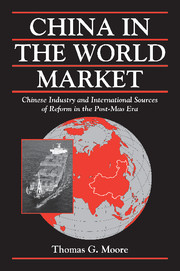Book contents
- Frontmatter
- Contents
- List of Figures
- List of Abbreviations
- Preface
- 1 China as a Latecomer in World Industrial Markets
- 2 The Outside World as an Impetus for Change in China
- 3 Tailor to the World: China's Emergence as a Global Power in Textiles
- 4 Beating the System with Industrial Restructuring: China's Response to the Multifiber Arrangement (MFA)
- 5 China Looms Large: Reform and Rationalization in the Textile Industry
- 6 Industrial Change in the Shadow of the MFA: The Role of Top-Level Strategy, Mid-Level Intervention, and Low-Level Demand in China's Textile Industry
- 7 Chinese Shipbuilding: The Modest Origins of an Emerging Industrial Giant
- 8 Dangerous Currents: Navigating Boom and Bust Cycles in International Shipbuilding
- 9 Chinese Shipbuilding and Global Surplus Capacity: Making a Virtue out of Necessity
- 10 Market-Oriented Solutions for Industrial Adjustment: The Changing Pattern of State Intervention in Chinese Shipbuilding
- 11 Who Did What to Whom?: Making Sense of the Reform Process in China's Shipbuilding Industry
- 12 External Shocks, State Capacity, and National Responses for Economic Adjustment: Explaining Industrial Change in China
- 13 China in the Contemporary International Political Economy
- Appendix Contours of the Research Effort
- Bibliography
- Index
1 - China as a Latecomer in World Industrial Markets
Published online by Cambridge University Press: 07 August 2009
- Frontmatter
- Contents
- List of Figures
- List of Abbreviations
- Preface
- 1 China as a Latecomer in World Industrial Markets
- 2 The Outside World as an Impetus for Change in China
- 3 Tailor to the World: China's Emergence as a Global Power in Textiles
- 4 Beating the System with Industrial Restructuring: China's Response to the Multifiber Arrangement (MFA)
- 5 China Looms Large: Reform and Rationalization in the Textile Industry
- 6 Industrial Change in the Shadow of the MFA: The Role of Top-Level Strategy, Mid-Level Intervention, and Low-Level Demand in China's Textile Industry
- 7 Chinese Shipbuilding: The Modest Origins of an Emerging Industrial Giant
- 8 Dangerous Currents: Navigating Boom and Bust Cycles in International Shipbuilding
- 9 Chinese Shipbuilding and Global Surplus Capacity: Making a Virtue out of Necessity
- 10 Market-Oriented Solutions for Industrial Adjustment: The Changing Pattern of State Intervention in Chinese Shipbuilding
- 11 Who Did What to Whom?: Making Sense of the Reform Process in China's Shipbuilding Industry
- 12 External Shocks, State Capacity, and National Responses for Economic Adjustment: Explaining Industrial Change in China
- 13 China in the Contemporary International Political Economy
- Appendix Contours of the Research Effort
- Bibliography
- Index
Summary
REFORM CHINA: THE SLEEPING GIANT AWAKENS
With annual rates of growth in economic output and foreign trade that averaged nearly 10 and 16 percent, respectively, from 1978 to 2000, China's economic performance has in many ways become the envy of the developing world. Although the creation of wealth has been most pronounced in coastal areas, the number of Chinese living in absolute poverty nationwide has been reduced by more than 200 million during the reform era. While improvements in political life have been less signal, China has experienced a rise in material living standards that is, by most measures, unprecedented in the history of human civilization. According to the World Bank, China achieved the fastest doubling of economic output ever from 1978 to 1987, far outpacing both early industrializers (e.g., United Kingdom, United States, and Japan) and late industrializers (e.g., Brazil, South Korea, and Taiwan) alike. It then repeated the feat from 1987–1996. While economic disparities have widened between both coastal and interior areas and urban and rural areas, it is also true that economic growth has been widely shared across China. In fact, the World Bank reported that if the thirty provinces of China (many of which would rank as average-size countries in both territory and population) were counted as individual economies, “the twenty fastest-growing economies in the world between 1978 and 1995 would have been Chinese.”
- Type
- Chapter
- Information
- China in the World MarketChinese Industry and International Sources of Reform in the Post-Mao Era, pp. 1 - 33Publisher: Cambridge University PressPrint publication year: 2002



